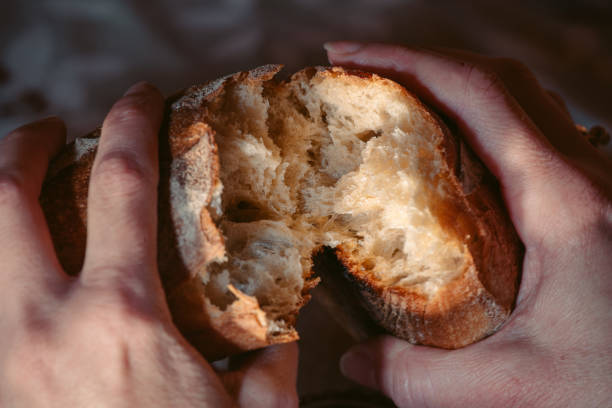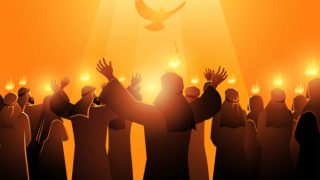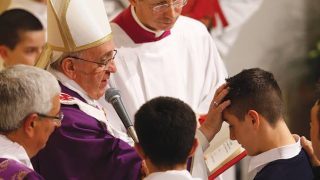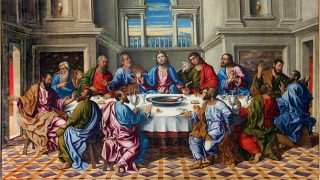
THE ENCOUNTER WITH CHRIST AT EMMAUS
HOMILY FOR THIRD SUNDAY OF EASTER, YEAR A. 23.04.2023. Readings: Acts 2:14.22-33; Psalm 16; 1 Peter 1:17-21 and Luke 24:13-25.
In the liturgy of today, the post resurrection events of Christ continues in the life of the Apostles and the Christian community. The liturgy invites us to reflect on the Good News, that Christ did not only shed his blood to ransom us from sin and eventually died for us; but the good news is that he rose from the dead and lives with us, which is the kerygma (a Greek word meaning the proclamation of the Good News of Christ) in the first reading. This is made visible in the gospel as he opens our hearts to the Scripture and the breaking of bread, the Eucharist at Emmaus.
The first reading presents Peter’s sermon on the day of Pentecost, where he broke the word of God to the disciples and today’s periscope is composed of the middle portion of that sermon. The first part of the sermon is from Acts 2:14-21 where he interprets the speaking of tongues of Pentecost in the light of a quotation from the Prophet Joel (Joel 2:28-32). The second part is the reading of today, which expresses the kerygma: the proclamation of the Good News of Christ and the last part of his sermon is vv. 33-36, where he establishes the relationship of the coming of the Spirit with the Good News of Jesus Christ.
In the reading, we see Peter, standing with the Eleven, preaching. The same Peter, who denied Christ three times has now been transformed by his encounter with the risen Christ and filled with the Holy Spirit, together with the disciples were standing before the Jews and all who dwelled in Jerusalem, arguing before them that it is impossible for Christ to be held captive by death, [As the song goes: ‘ death could not hold him captive, even in the grave, Christ remains Lord’]. In Peter’s argument, knowing fully well that the Jews have great respect for the prophets, especially David, and so could not dispute the fact that what he prophesied will come true, Peter reminded them of the Scripture passage that was written about David and his descendants, who foresaw and spoke of the resurrection of Christ, “That he was not abandoned to Hades, nor did his flesh see corruption” (Acts 2:25-27), as we also have it in the psalm of today. In the same vein, Christ has redeemed us by his blood and so we cannot be held captive by death, for we believe in the resurrection of the dead and share in the new life of Christ.
Also, Peter in the second reading calls us to live a life worthy of the new state of the resurrection of Christ when he reminds us that, “We are ransomed from the futile ways inherited from our fathers, not with perishable things such as silver or gold but by the precious blood of Christ” (1 Peter 1:17-19). This reminds me of a story a priest shared in his homily as regard paying of ransom. In the story, a priest was kidnapped and the kidnappers called the bishop of the priest to pay huge sum of money as ransom and failure to do so, they will kill his priest. In response, the bishop said to them, “My dear sons, that person you are holding is a priest of God and I thank you for taking care of him. As for ransom, his ransom has been already paid by Jesus Christ, so I cannot pay any other ransom for him.” With much threat to take his life, the bishop added, “My dear sons, that priest has died long ago with Christ during his ordination. So, whether he lives or dies, he belongs to Christ. Please do take good care of him.” The story went further that the priest was released miraculously. In this story we realize that our greatest fear is death. However, Peter gives a deeper insight to us as Christians that whether we live or die, we belong to the Lord who has ransomed us from death, not with money, nor silver or gold but through his death on the cross and his resurrection to life. Hence, we are not expected to go back to our old ways of life, but to live this new life in Christ through the scripture and the breaking of bread, the Eucharist.
The Gospel present to us the beautiful story we heard on Wednesday of the Octave of Easter, how the two disciples recognized Christ in the breaking of bread on their journey to Emmaus. At this journey, Christ celebrated the Holy Mass with these two disciples. He started with the first part of the mass, the liturgy of the word, which we have the Penitential Rite, where he made them realize their weaknesses, their failure to understand and belief in the scripture on what was written about him as he said, “O foolish men, and slow of heart to believe all that the prophets have spoken” (Lk 24:25). Then he continued with the readings, beginning with Moses and all the prophets, he gave the homily by explaining to them the readings of the day and all that was written about himself. After that, there was offertory, when they begged him to stay with them. So, they offered him the bread and proceeded to the second part of the liturgy, the Eucharist. At the table, he took bread, blessed it, broke it, and gave it to them.
It is worthy of note, the four important elements that happens during liturgy of the Eucharist. In the Eucharist, we offer ourselves as living sacrifice as Christ has done; the blessing over the gift replicates Christ’s very action, the breaking of bread (fractio panis), was not just to give a piece to each disciple but has a sacrificial meaning being consumed between Jesus and the Father, which signifies sharing and immolation. Also, submitting his will to the will of the Father. Hence, in the Eucharist, we must first “break” ourselves, giving ourselves out for the good of others and to God.
After the breaking of bread, the two disciples went and told others how they recognized Christ. Similarly, at the end of the mass, the priest says, “Go forth, the mass is ended.” It is an imperative to go and make the risen Lord known to the world like the disciples. We pray in the words of the disciples that Christ will stay with us as we encounter him in Holy Mass, which is our Emmaus.
Happy Sunday!
Fr. Ken Dogbo, OSJ










